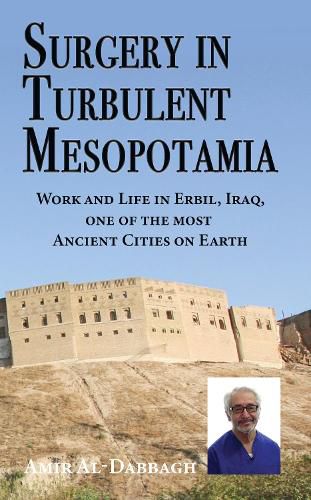Readings Newsletter
Become a Readings Member to make your shopping experience even easier.
Sign in or sign up for free!
You’re not far away from qualifying for FREE standard shipping within Australia
You’ve qualified for FREE standard shipping within Australia
The cart is loading…






This title is printed to order. This book may have been self-published. If so, we cannot guarantee the quality of the content. In the main most books will have gone through the editing process however some may not. We therefore suggest that you be aware of this before ordering this book. If in doubt check either the author or publisher’s details as we are unable to accept any returns unless they are faulty. Please contact us if you have any questions.
Through fourteen years of work as a surgeon in Erbil, Iraq, Amir Al-Dabbagh built a sense of genuine trust and friendship with his patients, the society of Erbil, his colleagues, and students in the city, a feeling that continues to inspire him to return to the city, and record his experiences in this memoir. Amir Al-Dabbagh started his medical career in 1970, graduating from Mosul and working in Iraq for six years before a period practicing medicine and surgery in the UK. After being forced into leaving Iraq in 1993, Amir continued working in the UK at Trafford General Hospital and the Manchester Royal Infirmary. His career has been one of patient care and student training, as a consultant surgeon and dean of a medical college in Erbil through peace and war. This memoir is a collection of thoughts and experiences of the medical profession through times of war and inner turmoil, fleeing as a refugee and collected wisdom on undergraduate and postgraduate training as well as good practice in patient care and surgery. The author reflects on the importance of family and friends and a genuine love of Erbil and Iraq, a beautiful country overflowing with history and welcoming people. Ultimately, nothing would have forced him to leave Erbil but the direct threat on his life. Also included is an account of Dr Waleed Khalid’s practice in Baghdad, as consultant cardiothoracic and vascular surgeon during the Iraq-Iran War and the First Gulf War, providing another interesting perspective on striving to care for one’s patients as a surgeon in turbulent times. Dr Waleed’s perseverance to build the first cardiothoracic and vascular unit in the north of Iraq was fraught with many obstacles, which he clearly highlights in his account.
$9.00 standard shipping within Australia
FREE standard shipping within Australia for orders over $100.00
Express & International shipping calculated at checkout
This title is printed to order. This book may have been self-published. If so, we cannot guarantee the quality of the content. In the main most books will have gone through the editing process however some may not. We therefore suggest that you be aware of this before ordering this book. If in doubt check either the author or publisher’s details as we are unable to accept any returns unless they are faulty. Please contact us if you have any questions.
Through fourteen years of work as a surgeon in Erbil, Iraq, Amir Al-Dabbagh built a sense of genuine trust and friendship with his patients, the society of Erbil, his colleagues, and students in the city, a feeling that continues to inspire him to return to the city, and record his experiences in this memoir. Amir Al-Dabbagh started his medical career in 1970, graduating from Mosul and working in Iraq for six years before a period practicing medicine and surgery in the UK. After being forced into leaving Iraq in 1993, Amir continued working in the UK at Trafford General Hospital and the Manchester Royal Infirmary. His career has been one of patient care and student training, as a consultant surgeon and dean of a medical college in Erbil through peace and war. This memoir is a collection of thoughts and experiences of the medical profession through times of war and inner turmoil, fleeing as a refugee and collected wisdom on undergraduate and postgraduate training as well as good practice in patient care and surgery. The author reflects on the importance of family and friends and a genuine love of Erbil and Iraq, a beautiful country overflowing with history and welcoming people. Ultimately, nothing would have forced him to leave Erbil but the direct threat on his life. Also included is an account of Dr Waleed Khalid’s practice in Baghdad, as consultant cardiothoracic and vascular surgeon during the Iraq-Iran War and the First Gulf War, providing another interesting perspective on striving to care for one’s patients as a surgeon in turbulent times. Dr Waleed’s perseverance to build the first cardiothoracic and vascular unit in the north of Iraq was fraught with many obstacles, which he clearly highlights in his account.